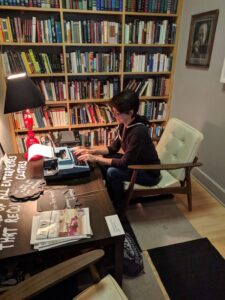“Two Warehouse Workers, Not Smoking” was inspired by the short story “Two Nurses, Smoking,” (The New Yorker, 2020) by David Means, and the investigative journalism of The New York Times.
The sign was written in half a dozen languages in order for its meaning to not be mistaken: A Smoke-Free Facility. No smoking within 20 feet of the building. No vaping. Punishable with a $600 fine.
“A month’s pay,” Billy said aloud.
Jack was there. He didn’t say anything that day, but he did look at the sign. It was so easy to skim over everything written on walls in the online shipping warehouse. Safety procedures seemed laughable given how often workers were injured; the stats for their particular building were daunting, since it was impossible to keep striving higher and higher; and all other signs blurred into a haze of red and white and yellow as most workers ran back and forth all day in order to complete their ever-rising quota. There was no time to read signs. Barely enough time in a single shift to run to one side of the warehouse, grab a ream of toilet paper, granola bars, and some shampoo before adding in a handful of books on renovation from the other side of the warehouse all for the same customer, and then scan the whole thing in order to hand it off to someone else in shipping.
Then do it all again.
In order to not miss their breaks, most workers had an alarm on their phones. You were allowed phones, even if the blurry signs said otherwise. How else were they going to listen to things as they ran in a blind haze to complete each order? Marvel at their step count later on? Or grab a break? So the overlords, or bosses and supervisors in this desolate location, allowed phones.
But definitely not smoking.
“They’re going to need to add cannabis soon,” Jack said the next day. He pointed to the sign when Billy seemed unsure. “No smoking, no vaping, and no indulging in 420.”
Billy smiled.
Jack smiled back.
It wasn’t quite a romantic meet-cute—especially since they’d already met and worked together for the past six months—but they’d only seen one another as strangers. As blurry men suffering the same fate. Even now, though they shared a joke outside the only sign they truly read and memorized, they still had no idea if this could be a romance.
It was hard enough to remember people’s names here, let alone pick them up.
“Billy,” he said a moment later. His phone beeped to signal break was done. His face became tense, no doubt, thinking of his quota.
“Jack,” he said. “Nice to meet you.”
“Same,” Billy said, and then ran into the building to keep making his quota.
Jack’s stomach fluttered. Staying around five seconds longer, to say something as innocuous and implied as same surely meant he was flirting. So he must have been gay, or bi, or uncaring of labels.
There certainly were enough signs everywhere that, at some point, everyone stopped looking too closely and simply accepted what they stocked and were told. So Jack did the same that day, keeping Billy in his mind.
◊ ◊ ◊
A week passed before they ran into one another again. They barely spoke, but it was still an achievement. It was hard to form or even maintain friendships, let alone a possible relationship, in the warehouse. Everyone was kept apart from one another, the breaks and lunch hours barely overlapping save for a stray five minutes; everyone needed to make a particular quota within a very tight time window, which meant no time for talking; and even bathroom breaks were so limited they may as well have been a joke. Billy had heard of some women and men wearing adult diapers in order to get through their shifts.
“It’s really not so bad,” a man in his fifties told him one afternoon, when they were both off at the same time. His name was Samuel. Or maybe his last name was Samuels. Once again, it was hard to remember. “At least I’m faring much better than most of the other people who wear them. I have a job. And my own hips.”
“And it’s better than the mesh underwear they give you at the hospital when you have kids,” a woman added. She was in her fifties, with a worn-down face that made her look older, and hair that was fried from too much dye. She smiled as she joked, revealing teeth that were missing farther back. “Then again, they don’t give you nothing in the hospital. That mesh underwear was at least 27 dollars.”
“I bet there are ones here for 25,” the older man said.
“But we don’t get a discount,” Billy added, longing to be part of this conversation. His back and shoulders and arms hurt. He was starving and his hands already shook from lack of lunch.
But people. Talking. It was so nice to be part of something.
“Nah,” the older man said. “They can’t take any further discount out. Where else does their profit go? But we have the honor and privilege of having free delivery.” He snorted with laughter, and so did the woman, as if they had told the best joke.
It was, in a way, sort of funny. Free shipping basically meant they would do it. For themselves. Billy had seen more than one person order something they needed—a new pair of shoes for their long shift—on the way to the warehouse, and then pick it up as their first task of the morning. It was common, but of course, there was also a sign warning against it.
“Do you need a ride anywhere?” the man asked Billy. The woman was gone. “My car’s a bit messy, but I don’t mind if you don’t mind.”
“I’m okay,” Billy said. A car being messy was code for it also being a house. No one was actually truly ashamed of the coffee cup or the spare change or dirt in their jeep or van as long as it wasn’t the end of the line. People only had shame and fear about their dwellings.
And a lot of people here, Billy had already realized, lived in their cars. They outfitted them with black out curtains or sheets purchased on their shifts and owned Dustbusters, if they were lucky, so they could make the dirt that accumulated disappear with a flick. There was also an ever-present lighter, a way to smoke on the property without violating any signs.
“Suit yourself,” the man said and slid behind the wheel. He drove out of the warehouse lot, and Billy watched until his taillights disappeared over the flat earth and industrial zone leading up to the warehouse. He said a prayer, though he was not religious, that he was safe.
Jack arrived then. Billy was looking at his phone, marveling at his step count, when he smelled a faint whiff of pot.
“No smoking,” Billy teased him.
“I didn’t.” Jack’s eyes went wide. They were brown, dark and deep. “I swear, I. . .”
“Hey man, it’s okay. That was supposed to be a joke.” Billy shrugged. “But I suppose this place doesn’t support humor.”
Jack’s face split in two with a smile. “No, I suppose it doesn’t. I should go, then. It also doesn’t support tardiness.”
“I hate that term, man,” Billy said, and surprised himself by telling a story from his elementary school years. “I lived out in the boonies and always needed to be bussed in. Not a big deal, you know, lots of kids get bussed. But because of where I lived, it was too far from the regular route, and since my mother insisted that she wanted me to go to that school for whatever reason, she organized a bus for me. Except that it was the disability bus. You know, the short bus. And so, for the first few years of school, I was called a retard.”
“Oh.”
“I know, that term isn’t used anymore. And for good reason, it hurts. I was called it, and I know it hurts. But you know what the funny thing about the whole experience was?”
To Billy’s surprise, Jack was still there. Listening intently. He even played along, and asked, “What?”
“The fact that we were always late. The short bus, the disability bus, the one that was called retarded all the time. Well, we shouldn’t have been called retards, but we were tardy.” Billy shook his head, laughing. So did Jack. “It’s a bad story.”
Jack smiled again. “Maybe.”
Their gazes met and lingered. Billy wanted to talk and talk and talk now, his shift over, and his life his own again.
But Jack was not in the same place. He shifted from foot to foot, scared of something, but also bright and attentive to Billy. “I feel like a spider,” Billy said. “I’ve caught you in a web. Go to work. I’m just being ridiculous.”
“And I’m still sobering up,” Jack confessed.
“I won’t tell if you won’t tell,” Billy said.
“Deal.” Jack extended his hand. Billy shook it. A spark, or something else equally out of place in front of the greying walls and multiple signs of the warehouse facility, passed between them.
“Until next time,” Billy said and stepped away.
“Until then,” Jack agreed, and soon added with a devious grin, “I won’t be tardy.”
◊ ◊ ◊
The next time happened. Casual, nice conversation. But they were still dancing around one another, unsure if the person was actually gay. Could just be friendly, could be high, could be from another culture, way, lifestyle, anything, so his actions had a different meaning. So they talked and talked and talked about nothing at all. They danced and twisted and smiled at one another if they passed by during their shift.
A smile was enough to give hope, and they always found reasons to come back to the other. Jack was pretty sure Billy was gay—that feeling in his gut, sinking with desire but also floating with something else—but he still didn’t say anything. He figured that even if Billy was gay, he could have a boyfriend, a celibacy pact, a disease that made him go broke and so he took the job at the warehouse to survive. There were so many—hundreds, thousands—of reasons why people ended up in this warehouse. A thousand different tragic circumstances related to money and family and debt that neither one of them wanted to broach that issue, either. To ask ‘why are you here’ or ‘how did you get here’ in the facility was to break an unspoken bond between workers, a reason why they didn’t, deep down, mind all the signs keeping them apart.
Eventually, and probably out of sheer boredom, Billy spoke up first, “So, how did you get here?”
“Me?”
“Do you see anyone else?” Billy asked, though it had to be rhetorical. They were talking in front of the warehouse, the door propped open in the blazing summer heat so they didn’t all die inside from a lack of air conditioning, and there were more workers spilling in for the start of their shift. There were tons of people here, an entire village if they were devoted enough to band together, but none of those people counted.
It was just Billy and Jack.
“I was fired from my other job,” Jack said.
“For what?” Billy pressed.
“Being gay, actually,” Jack said as if he was discovering this fact for the first time. “I worked with developmentally delayed kids. Cerebral palsy, deafness and blindness, muscular dystrophy, things like that. One mother found out I had a boyfriend. She saw us out somewhere, I don’t remember, and she told my boss. Demanded I be fired since I was a bad influence on her kid. She brought in newspaper stories about gay men who molested youths, you know, boogeyman stuff. But it worked on my bosses.”
“That’s terrible,” Billy said, though his voice was even. “You could have sued.”
“That takes money.”
“Some lawyers take on pro bono work. And others you don’t pay until they win.”
“Those guys all have commercials, and I was told a long time ago not to trust anything on daytime TV.”
Billy laughed, which made his blue eyes light up. “Probably a good rule.”
“I didn’t sue because I was, well, guilty. For the gay part, anyway.” Jack shrugged. His back hurt and spasmed as he did. “My boyfriend dumped me right afterwards, too, and so it was just too hard. I’d been blackballed in my field, and was alone, and…”
“This magic flyer showed up, saying you could have a new career,” Billy said, intoning and reciting words from the same thing that had gotten him the job.
“Yeah,” Jack chuckled. “Too good to be true. Shouldn’t have trusted it, I guess.”
“Well, it wasn’t on daytime TV. How were you supposed to know?”
“Good point.” Jack chuckled again. Then he stared at Billy, longing for more. A clock above their heads, along with a subtle vibration of their phones, reminded them that break was over. Gone. They were on company time now. They could fall behind in their quota. And they would be screwed, yet again, in their lives.
“I’m gay, by the way,” Billy said. “Just to speak of something lighter.”
“Me too.”
“And single,” Billy added again.
“Me too.”
“Good to know,” Billy said. Jack smiled. He reached into his shirt for something, only to snap his hand back.
“No smoking,” Billy said. “But I don’t care if it’s at my place.”
Jack nodded and said nothing more. Eventually, they went back to work. Their shifts did not line up, so they didn’t see one another again. Not for a few more days.
◊ ◊ ◊
Maybe it was more like a week.
Billy was sure that Jack was avoiding him, like a secret that he didn’t want out. While Billy had told him one of his most embarrassing stories—that until high school he was the slow bus kid—and confessed his sexuality, Jack had not truly reciprocated. He’d crawled into his shell, become more devoted to the job, and outright seemed to ignore Billy if they crossed pathways getting their shipping items.
“Hey,” Billy greeted one morning. His tone was urgent, demanding. It cut through all bullshit and made Jack look up from his phone.
“Hey,” Jack mirrored. He glanced back at his device. He leaned against the wall of the warehouse beneath that no smoking sign. He still didn’t look up, not even as he asked, “How are you?”
“Pissed.”
“Who isn’t?”
“I’m pissed at you,” Billy clarified.
“At me?”
“I wanted to talk to you more, but you keep disappearing.”
“That’s the job.”
“I know. But you found time before.”
Jack nodded slowly. He looked around, as if sensing for their supervisor, and Billy’s chest tightened. Had Jack gotten disciplined? Had his numbers been low? Another series of small indignities played themselves out in Billy’s mind. His anger and frustration at the lack of flirting was so trivial.
“Never mind,” he added quickly. “I’m sorry.”
“It’s fine. But don’t go in yet.” Jack held his long forearm over the door. When Billy brushed against it, they both seemed to pause a moment to take it in. To savor it. As if they both had not been touched in a long, long time.
“Fuck I wish I could quit,” Jack said. “I’m late with a payment I really need to make.”
“How much?” Billy asked, though he had no idea why. It wasn’t as if he could offer to pay it. He had three cents in his pocket and seven dollars in his bank account. “Never mind. I know it’s huge. Everything is.”
“I can call in sick,” Jack said, musing aloud. “I could probably get away with that. Late is already late, you know?”
“I think I do. And I could, too,” Billy said, though it was a lie. He had to work. Everyone here had to work.
But they also had to live, too, right?
When their gazes met, and utter glee crossed their faces, both of them lost seven years of life.
Billy was now sixteen, utterly free after just learning how to drive, while Jack was twenty, now moved out of his parents’ home. He thought of all the men he’d made out with in his terrible apartment; Billy, too, thought of all the people he’d fucked in his car.
Both of them headed to Billy’s car now, cell phones pressed to their ears as they called in sick. They decided to go to Jack’s place, since he didn’t have a roommate.
“Got used to living alone a long time ago,” he explained. “Never trading it for anything.”
“Anything?”
“Anything.”
Jack was sure he imagined a frown on Billy’s face. The expression was gone in a few seconds. Then they were home. Then they were touching each other, making out, and removing every stitch of fabric they could without breaking that kiss. Each one of them had bruises on their backs, arms, and legs from the warehouse. Jack had a scar running from one nipple to his rib-cage. Billy had tattoos, many of which were amateur and far too youthful. Each one of them kissed and sucked and made other welts appear right alongside their many markings from before.
When they were both naked, they spent a lot of time on top of the covers, still making out. Billy hated that he knew these bed sheets by call number at work, so it was he who progressed to the next level.
“You have anything?”
“Bedside table.”
The bedside table was really a milk crate. Inside a metal pencil case, almost as if he’d had a class in safe sex, was all they’d need. Billy asked Jack to slip the condom on him. He liked that act of fragile intimacy, as if they were truly seeing and experiencing all of one another.
Jack crooned and keened with each touch and thrust. But he, too, began to hate the fact that all sorts of safety precautions for sex made him think of the signs at work. Hard hat needed, safety goggles necessary, highly flammable. When they were done, and cleaned up, Jack wanted to smoke but instead repeated the sign where they’d first met.
“A Smoke-Free Facility. No smoking within 20 feet of the building. No vaping. Punishable with a $600 fine.”
“Pot’s not there yet,” Billy said. “We could do that.”
Jack opened a soft cloth bag where he kept his weed. He had enough for one joint. So they smoked, and they talked in their own language now, one not governed by debt or work or procedures. They spoke about families and lovers and friends; about all the places they’d lived and wanted to live in the future; they spoke about the better times of their lives, and then Jack shared his one negative experience in school, so that they were even on the surface.
“You were called tardy,” Jack said. “But I was called shark boy. I was fourteen, you know, and things were raging inside. I got random boners a lot. Totally normal, yeah? I had older brothers and they, not my mom or stepdad, told me about them. How to hide, how to stave one off halfway if at all possible, how it didn’t mean anything if I got a boner while watching something completely unsexy. So when I first noticed I had a boner during shark week at school, I thought I was okay. But then I was asked to write an answer on the board. And well, you can guess.”
“Shark boy,” Billy said, and then snickered. He ran a hand through Jack’s hair so he knew he was supported, even as Billy laughed. He began to hum that terrible “Baby Shark”‘ song; though they both didn’t have any kids or small family members who knew the song, they had shelved and restocked and touched enough items in a desolate warehouse related to that dumb children’s song that they knew the words as if they did have a family.
“That’s terrible,” Billy eventually said. “I’m sorry that happened to you.”
“You know, compared to all the other things that would, it was nothing.”
“I think you’re right about that.”
Both of them grew silent. A tension spread over them, one that lingered, one that spoke of consequences of a relationship in a place that didn’t support it, and how they could possibly make up for the lost wages of the day.
Billy kissed him first. Jack turned towards it, and they sunk down into the bed together. If you’re already late, what’s another couple days? They’d already made their decisions, after all. May as well get every last ounce of goodness they could get out of it.
So they did.
The next morning at work, when they walked by one another and the no smoking sign, they acted as if it’d never happened.
◊ ◊ ◊
Jack had no idea why he didn’t say hello anymore. A week passed, then another. Snow had begun to fall in regular intervals, and everyone was tense in the warehouse, thinking of the upcoming Christmas season. Jack worked and worked, and so did Billy, and so he tried to convince himself that nothing was wrong.
Billy, too, had no idea why they had stopped talking. But he’d been around enough men who were still in the closet that he could also understand. Any kind of vulnerability presented at work could be something that their supervisor would twist into a bargaining tool. Hell, maybe the upper echelon were worried about him and Jack forming a union, rather than getting in one another’s pants. Especially if they were getting in one another’s pants. Didn’t all unions also have epic love stories attached to them? Or was that Hollywood’s way of making their misapprehensions about communism palatable?
That thought, and the Google search it inspired, carried through Billy’s mind all day. He daydreamed about Frida Kahlo and Diego Rivera; Emma Goldman and her anarchist husband, and many other people to whom their romance was only one small aspect of their politically charged lives. May as well use those research skills learned in school, Billy figured, so that the degree which was sitting on his wall, gathering dust around the frame, didn’t seem too pointless.
Finally, a month and a half after they’d fucked, Jack broke the silence. “Look,” he said, and pointed to the sign above Billy’s head. “They added it.”
Billy turned around. No cannabis use had been added underneath the no smoking sign. He smiled despite what it meant, despite the year he’d now worked here. This felt like a victory. It felt like predicting Krakatoa, or even something less earth-shattering, like what a child’s first words would be.
“No smoking indeed,” he said. “Nothing about edibles though.”
Jack smiled. It split his face in two once again. “Just give them time. They’ll figure it out.”
Billy nodded.
So did Jack.
Then, without warning, Jack closed the distance between their bodies. He kissed him fully on the mouth, below the no smoking sign with its many amendments, and then pushed him gently against the concrete wall. Billy opened to the embrace. He kissed back vigorously before he snaked his arms through Jack’s and gripped his waist.
“I’m not going anywhere,” Billy whispered when Jack stopped the kiss. He still held his arms possessively over Billy’s body. “Except maybe to quit.”
“Impossible.”
“I know. But we should talk again.”
“We should.”
This time, Billy kissed Jack. A few coworkers had started to spill in and out of the warehouse door next to them. They looked, but soon turned away. None of their business, none of their focus. Others who knew their names and some bits and pieces of their lives lingered a touch longer with their gazes, but still said nothing. Maybe they would ask Billy and Jack about this later on, or mock them for being queers, but probably not. There were so many things to do in the warehouse, it was impossible to take time out for names or slurs anymore. Everyone just wanted to survive.
“This is nice,” Jack said. “We should do this more.”
“Until they add another sign for kissing, too. Take away all the fun.”
“We’ll find it again.”
“That’s corny.”
“Yeah. But I need something to get me through the shift.”
“Same.”
Another moment, another kiss, then both of their phones buzzed with a warning. Work was going to begin soon. Break over. Their gazes met and they dreamed silently of another day all to themselves. They kissed again, harder and harder, to make up for lost time.
◊ ◊ ◊
When Jack’s shift was over, he stood at the backdoor and looked out at the parking lot. He noted the messy dashboards of vans and sedans that had been converted into homes. A pendant for another faith—maybe Sikhism—which hung off other car mirrors. Dented bumpers, expired license stickers, donuts on all four of someone’s wheels.
Then he saw Billy. He leaned out of his car door in order to gesture to Jack to come over.
Jack did.
They kissed.
For a moment as they pulled away from the lot, Jack wondered if they were going to keep driving. Past the industrial buildings and the waste that marked each corner, through the city, and into the vast plains all around them. A horizon filled with their runaway plans, a new kind of Thelma and Louise, only without the death.
“Does death wipe out debt?” Jack asked. “Even for credit cards? Student loans?”
“I already looked into it,” Billy said.
It wasn’t an answer, but it also was. I’ve already looked and it’s not worth it. When Billy met Jack’s gaze, he also silently added, Don’t do it. It’s really not worth it.
So Jack dropped the thought. He imagined them as pioneers, as explorers, and then just as men as they finished their drive.
In the apartment, in the bed, they did the same thing over and over again. But it was also different, too. Brand new.
◊ ◊ ◊
Christmas passed. They spent it together, working. Then together again, during the time that was all their own and no one, not even the company that seemed to own and destroy everything, could take from them.
◊ ◊ ◊
After the holidays, a camera system was installed. The black security orb, one that Jack mistook for a raven at first, was now perched and aimed right at the space underneath the no sign.
“This is less to do with the gay,” Billy said and pointed to the blinking red light. “And more to do with the fear of us all unionizing.”
“Oh?”
“Yeah. I was watching an expose about union busting on one of those funny news channels,” he explained. “We all live and work in terrible conditions, have you heard?”
“I think I may have.”
Billy and Jack exchanged a short laugh. Then Billy shrugged. “Things might change soon, who knows? But I doubt it.”
“Me too.”
“Do you mind?” Billy asked. He pointed to the camera. “Being watched?”
“I can get used to it.”
“We can get used to a lot of things, good or bad,” Billy added. “You sure you want to?”
Jack nodded. He took Billy’s hand, and then, under full view of the camera, kissed him again. The camera emitted a mechanical sound, the red light flashing. Several more people walked in and out of the warehouse, paying them no mind. It wasn’t until their supervisor came out of the warehouse and lit up a cigarette that both men broke their kiss.
“Hey,” Jack said. “Can’t you read the sign?”
Their supervisor looked up, surveyed the many languages, but soon shrugged away all concerns.
He lit up. The smell was intoxicating, familiar, and so much like home. “We should go to work,” Billy said, turning to Jack. “I have bills.”
“Me too.”
“See you later?” Billy asked. His feelings were transparent, his emotions utterly laid bare, and he absolutely hated it. He bit his lip as the silence spread out and out. “Never–”
“Sure.” Jack touched his shoulder, a smile on his face. “Your place or mine?”
“Wherever. Doesn’t matter.” Billy’s gaze flicked to the sign above them. “We’ll just end up back here.”
…
 Eve Morton lives in Waterloo, Ontario, Canada with her partner and two sons. She likes coffee, tarot, and short fiction, especially sf/f. “Two Warehouse Workers, Not Smoking” was inspired by the short story “Two Nurses, Smoking,” by David Means, and the investigative journalism of The New York Times. Find more information on Eve’s work at authormorton.wordpress.com.
Eve Morton lives in Waterloo, Ontario, Canada with her partner and two sons. She likes coffee, tarot, and short fiction, especially sf/f. “Two Warehouse Workers, Not Smoking” was inspired by the short story “Two Nurses, Smoking,” by David Means, and the investigative journalism of The New York Times. Find more information on Eve’s work at authormorton.wordpress.com.






